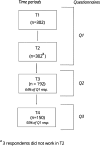From applause to disappointment - appreciation among healthcare providers that provided end-of-life care during the COVID-19 pandemic and its impact on well-being - a longitudinal mixed methods study (the CO-LIVE study)
- PMID: 39695730
- PMCID: PMC11653579
- DOI: 10.1186/s12913-024-11999-6
From applause to disappointment - appreciation among healthcare providers that provided end-of-life care during the COVID-19 pandemic and its impact on well-being - a longitudinal mixed methods study (the CO-LIVE study)
Abstract
Background: The healthcare sector is facing increasing work pressure, making a healthy workforce essential. Appreciation is a factor influencing well-being, and the COVID-19 pandemic offers valuable insights into this. This study aims to: 1) describe to what extent end-of-life care providers felt appreciated and understood during the first 18 months of the pandemic, 2) examine the impact of appreciation on their well-being, and 3) explore their perceptions of what appreciation should look like.
Methods: A longitudinal mixed methods study among healthcare providers in the Netherlands delivering end-of-life care during the COVID-19 pandemic. Surveys were conducted at four timepoints (n = 302), and interviews were conducted at three timepoints (n = 17) during the first 18 months of the pandemic. Generalized Estimating Equations analysis was performed on the quantitative data and thematic analysis was conducted on the interview data.
Results: This study shows that feeling of appreciation among healthcare providers peaked in the first wave of the pandemic, but significantly dropped in the second wave, with only about half of the healthcare providers feeling appreciated. This slightly improved afterwards. Furthermore, nearly half of healthcare providers felt misunderstood during the first 18 months of the pandemic. Additionally, this study shows that between September 2020 and September 2021 about 1 in 3 healthcare providers had a score on the Well-Being Index indicating higher risk for burnout. Feeling appreciated and not feeling understood were both significantly associated with worse well-being. Interviews revealed that nurses did not always feel understood and appreciated by society, employers, patients and their families, as well as their own friends and family, leading to feelings of sadness, anger, and frustration. Three major themes emerged: 'recognizing real needs, 'we are not in this together' and 'short-lived appreciation that failed to lead to structural changes'.
Conclusions: This study shows that during the COVID-19 pandemic, healthcare providers often felt neither appreciated nor understood, which is associated with lower scores of well-being. The expressed appreciation often did meet their needs or expectations, from both employers and society. With healthcare provider well-being still under strain, sustained attention to appreciation and understanding is important for retaining the workforce.
Keywords: Apprecation; COVID-19; End-of-life care; Healthcare providers.
© 2024. The Author(s).
Conflict of interest statement
Declarations. Ethics approval and consent to participate: The Medical Research Ethics Committee of the Erasmus MC in Rotterdam, the Netherlands determined exception from formal review under Dutch law (MEC-2020–0254). Informed consent was obtained from all participants involved in the study. All methods were carried out in accordance with relevant guidelines and regulations. Consent for publication: Not applicable. Competing interests: The authors declare no competing interests.
Figures
Similar articles
-
Distress among healthcare providers who provided end-of-life care during the COVID-19 pandemic: a longitudinal survey study (the CO-LIVE study).BMC Palliat Care. 2024 May 28;23(1):134. doi: 10.1186/s12904-024-01446-y. BMC Palliat Care. 2024. PMID: 38802776 Free PMC article.
-
How end-of-life care was limited during the first 18 months of the COVID-19 pandemic: a longitudinal survey study among healthcare providers (the CO-LIVE study).BMC Palliat Care. 2024 Jul 26;23(1):187. doi: 10.1186/s12904-024-01514-3. BMC Palliat Care. 2024. PMID: 39060925 Free PMC article.
-
Health care providers' perceptions of burnout and moral distress during the COVID-19 pandemic: A qualitative study from Saskatchewan, Canada.J Health Serv Res Policy. 2025 Apr;30(2):109-116. doi: 10.1177/13558196241287336. Epub 2024 Oct 1. J Health Serv Res Policy. 2025. PMID: 39352947 Free PMC article.
-
Reshaping care in the aftermath of the pandemic. Implications for cardiology health systems.Eur J Intern Med. 2023 Mar;109:4-11. doi: 10.1016/j.ejim.2022.11.029. Epub 2022 Nov 30. Eur J Intern Med. 2023. PMID: 36462964 Free PMC article. Review.
-
Measurement of Work-Life Balance: A Scoping Review with a Focus on the Health Sector.J Nurs Manag. 2023 Mar 4;2023:3666224. doi: 10.1155/2023/3666224. eCollection 2023. J Nurs Manag. 2023. PMID: 40225624 Free PMC article.
Cited by
-
Exploring perceptions of work motivation through the experiences of healthcare professionals who provided end-of-life care during the COVID-19 pandemic (PRECA-C project): a qualitative study.Hum Resour Health. 2025 Jun 13;23(1):28. doi: 10.1186/s12960-025-00997-2. Hum Resour Health. 2025. PMID: 40514643 Free PMC article.
References
-
- Organization WH. Health and care workforce in Europe: time to act: World Health Organization. Regional Office for Europe; 2022.
-
- Zorgakkoord I. Samen werken aan gezonde zorg. 2022.
-
- PZNL/AHzN/KWF/VPTZ. Trendanalyse Palliatieve Zorg. 2020.
-
- Samenleving RV. Applaus is niet genoeg: anders waarderen en erkennen van zorgverleners. 2020.
MeSH terms
Grants and funding
LinkOut - more resources
Full Text Sources
Medical



